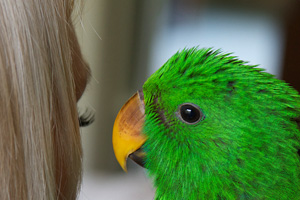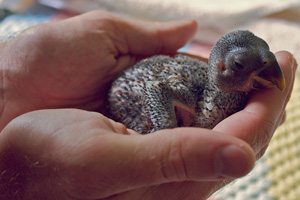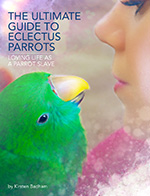The Hand Raising Process
Hand raising a companion Eckie is a full time job. Baby Eckies require feeding every four hours. This means the aviculturist must be around their babies 24/7. However, this does not always mean the breeder spends time socialising their babies. Some aviculturists hand-raise a large number of parrots, and interacting with each baby may be impractical. Some hobbyist breeders work full time jobs, while other breeders work from home and are able to devote a great deal of time to each baby.
Ask the breeder how many babies they are raising, and how much time they spend with their Eckies on a daily basis. We spend 2 to 3 hours a day with our fledging kids. Companion Eckies need this interaction to prepare them for life in their humanised world.

Has the Eckie been exposed to activities such as sharing dinner time, showering, car rides, household noises, vacuum cleaners, T.V, music etc?
Every Eckie is unique. They have their likes, dislikes and tolerances. Jason and I expose our babies to as many different aspects of our humanised world as possible. This helps us understand a little more about their personality and also discover any fears they may have.
Finding a breeder who introduces their Eckies to the everyday workings of a household is invaluable.
How has the baby been fed?
There are three different techniques used to feed unweaned parrots. Spoon feeding, syringe feeding and crop tubing. Spoon-feeding is the preferred technique when raising companion parrots. This manner of feeding is the most time consuming, and messiest, but, it is the closest we can get to simulating natural feeding technique of the hen bird. Spoon-feeding allows the baby to pump for their food as they would with the hen bird and gives the baby the one-on-one interaction they need.

Remember, we are not human
Eckies may live in a humanised environment, yet it is vital the breeder treat them as a parrot, not a human. As their carers, we can encourage the instinctive behaviour of fledglings, such as their need to forage. Coddling a parrot is counterproductive and may lead to dependency and identity issues. Ensure you find a breeder who encourages their parrots instinctive behaviour.
As future Eckie owners, it is a good idea to ask your potential breeder a number of questions. The following will help ensure that you are buying from someone who cares about their feathered kids, and raises them to the best of their ability.

This is a short excerpt from our book 'The Ultimate Guide to Eclectus Parrots'. This chapter explains the importance of choosing a top quality breeder and the 17 most important questions to ask when buying your companion Eclectus.
Our book also includes information on:
- The differences between male and female Eclectus
- Choosing the right breeder
- The dangers of buying an unweaned bird
- Cage size and setup
- Bonding
- Dietary needs
- The Eclectus moult
- Stress bars and feather barring
- Emergency care
- Eclectus body language
- Recall training
- Teaching your Eckie to talk
- And many more chapters and topics!